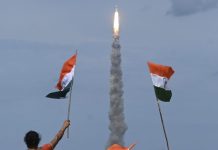A presentation on the TAPI gas pipeline was delivered by Turkmenistan at the United Nations Development Program headquartered at New York. TAPI pipeline is a highly ambitious gas pipeline project between Turkmenistan, Afghanistan, Pakistan, and India which aims at establishing new great energy silk route. This energy route will give access to modern, sustainable and reliable energy to member states.
- India-China Relations Improving After Delhi Acknowledges Beijing’s Might: China
- Al-Qaeda Recruiting Kashmiri Militants for Ghazwa-e-Hind Plan for India
The event at which the presentation was delivered was organized by the Permanent Mission of Turkmenistan to the UN. It was facilitated by Afghanistan, Pakistan and India. Turkmenistan envisages this gas pipeline project as a great energy silk route that will connect the regions of Southern Central Asia.
The chairman of the TAPI pipeline company said at the presentation that this strategic gas pipeline project will not only solve the issue of energy needs but also generate innumerable jobs and will solve the concerns of regional energy security.
Officials from India, Afghanistan and Pakistan were convinced by the fact that this pipeline project will indeed hold a great significance for their respective economic interests and their energy needs. The pipeline will also lead to the generation of employment in these nations, develop infrastructure and eventually lead to the multilateral security of South Asia as well as central Asia.
For the finances of the TAPI gas line project, several meetings have already been held with a number of export credit agencies. Even the Asian Development Bank has expressed interest to finance the TAPI pipeline. The Asian Development Bank looks to finance the project in terms of sovereign financing and direct financing. The sovereign financing will cover the part of the equity capital for the project. The total expenditure as per one of the estimates is around $7 billion.
The TAPI pipeline promises to be of a great strategic significance of Asia in terms of energy requirements as well as for opportunities of employment generation and infrastructure development.
More News at EurAsian Times
- Indian Military Base in Sabang can Strangle China at the Strait of Malacca
- Why is Japan Unhappy with Bullet Train Project in India?
- From Asia to Africa, India-Japan Defence Partnership Aggressively Countering China




